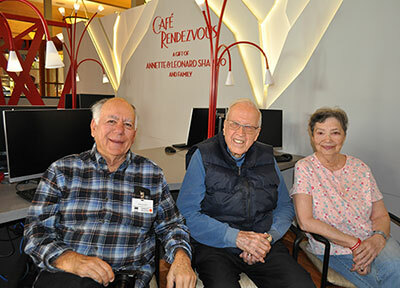A Snapshot of Jewish Home Life


A Snapshot of Jewish Home Life
Photographic images can tell a compelling story. But if a picture is worth 1,000 words, it is only because of the talent of the person behind the camera.

The Jewish Home's Photography Club is a case in point. Led by volunteer instructor Ron Cooper, a retired dentist and lifelong photography buff, the club enables residents of the Home to tap into their creativity and strengthen their powers of self-expression. The club meets weekly at Eisenberg Village and is open to residents of all skill levels.
L.A. native Ron began taking pictures in grammar school; by the time he was a teenager, he was catching a bus from Westwood to a storefront on Western Avenue run by Otto Rothschild, a prominent performing arts photographer. "I would hang around the dark room and learn how to print photos," Ron remembers. "Ever since I was little, photography has helped shape my view of the world. The fact is that once you develop the skill, you see things better even when you're not taking pictures."
Once he stopped practicing dentistry, Ron began looking for ways to get involved in the community. Sharing his passion for photography seemed like a good way to give back. He had heard about the Home from board chair Andrew Berman, and from the moment he walked on campus to teach, he knew it was a perfect fit.
"I walked into the Pepp Center and immediately felt comfortable," Ron recalls. "Gertrude and Ray Pepp were among my parents' closest friends."
Ron has been delighted by the interest and excitement of Photography Club members like Marilyn Weiner and Ray Joseph. "Based on the ideas they have and the questions they ask, I'm learning a lot myself," he notes. "And, through my interactions with them, I can tell the Home offers such a healthy and nurturing environment."
For Ray, who moved into the Home three years ago, the Photography Club has been a wonderful way to continue a hobby that stretches back decades. "I took pictures semi-professionally for years—submitting them to magazines and selling them to newspapers," he says. "At the Home, I'm using an iPhone to shoot the statues situated all across campus."
Marilyn is focused on photo editing—a particular expertise of Cooper's. "We sit together at the computer, and I teach her different editing techniques," he says. "She's getting good and can now do some of it on her own."
Eventually, club members hope to showcase their work in an exhibit at the Home. "I'm eager for people to see what we're producing," Ray says. "Once they take a look at how good iPhone cameras are, and how easy they are to use, they might decide to take up photography, as well!"